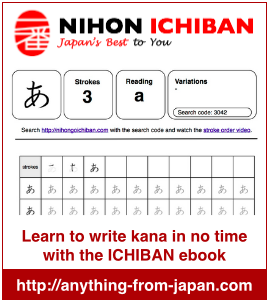All about grammar of nouns for the JLPT N5
This is a collection of grammar forms that are likely to be required to pass the JLPT N5 level. Place your cursor above the grammar description to get more detailed information where available.
NOUN + DESU (です)
| Kanji | 私は日本人です。 |
| Furigana | わたしはにほんじんです。 |
| Romaji | watashi wa nihonjin desu. |
| English | I am Japanese. |
NOUN + DEWA arimasen (ではありません)
| Kanji | 私は日本人ではありません。 |
| Furigana | わたしはにほんじんではありません。 |
| Romaji | watashi wa nihonjin dewa arimasen. |
| English | I am not Japanese. |
NOUN + DESHITA (でした)
| Kanji | 昨日は日曜日でした。 |
| Furigana | きのうはにちようびでした。 |
| Romaji | kinou wa nichiyoubi deshita. |
| English | Yesterday was sunday. |
NOUN + DEwa arimasen deSHITA (ではありませんでした)
| Kanji | 昨日は休みの日ではありませんでした。 |
| Furigana | きのうはやすみのひではありませんでした。 |
| Romaji | kinou wa yasumi no hi dewa arimasen deshita. |
| English | Yesterday was not a vacation day. |
NOUN + DA (だ)
| Kanji | 私は学生だ。 |
| Furigana | わたしはがくせいだ。 |
| Romaji | watashi wa gakusei da. |
| English | I am a student. |
NOUN + Dewa nai (ではない)
| Kanji | 私は日本人ではないです。 |
| Furigana | わたしはにほんじんではないです。 |
| Romaji | watashi wa nihonjin dewa nai desu. |
| English | I am not Japanese. |
NOUN + datta (だった)
| Kanji | 昨日は休みの日だった。 |
| Furigana | きのうはやすみのひだった。 |
| Romaji | kinou wa yasumi no hi datta. |
| English | yesterday was a vacation day. |
NOUN + dewa nakatta (ではなかった)
| Kanji | 昨日は休みの日ではなかった。 |
| Furigana | きのうはやすみのひではなかった。 |
| Romaji | kinou wa yasumi no hi dewa nakatta. |
| English | yesterday was not a vacation day. |
NOUN + DE (で)
| Kanji | 私は学生で友達は先生です。 |
| Furigana | わたしはがくせいでともだちはせんせいです。 |
| Romaji | watashi wa gakusei de tomodachi wa sensei desu. |
| English | I am a student and my friend is teacher. |
NOUN + NO (の) + NOUN
| Kanji | これは先生の本です。 |
| Furigana | これはせんせいのほんです。 |
| Romaji | kore wa sensei no hon desu. |
| English | This is the teacher’s book. |
NOUN + NO (の)
| Kanji | この本は私のです。 |
| Furigana | このほんはわたしのです。 |
| Romaji | kono hon wa watashi no desu. |
| English | The book there is mine. |

